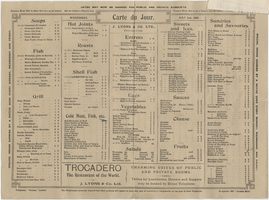Search the Special Collections and Archives Portal
Search Results
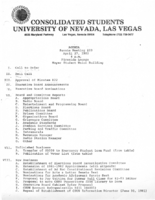
Meeting minutes for Consolidated Student Senate, University of Nevada, Las Vegas, April 27, 1982
Date
Archival Collection
Description
Text
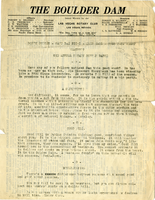
The Boulder Dam Las Vegas Rotary Club newsletter, March 10, 1927
Date
Archival Collection
Description
Text
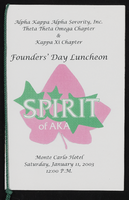
Alpha Kappa Alpha Sorority, Theta Theta Omega Chapter Founders Day luncheon program
Date
Archival Collection
Description
From the Alpha Kappa Alpha Sorority, Incorporated, Theta Theta Omega Chapter Records (MS-01014) -- Chapter records file.
Text
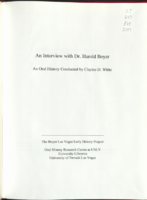
Transcript of interview with Dr. Harold Boyer by Claytee D. White, November 15, 2000
Date
Archival Collection
Description
Text

Transcript of interview with Darrin Bush by Claytee White, June 30, 2016
Date
Archival Collection
Description
In 1948 in Las Vegas, Nevada, a camera-girl-turned-cocktail-waitress and a casino credit manager welcomed the birth of their son, Darrin Bush. After attaining his education at St. Joseph’s Catholic School and Bishop Gorman High School, Bush earned his Bachelor’s degree in journalism at the University of Nevada, Reno. Bush credits his love for photography to his mother’s influence and his study of journalism. Bush’s first job after college as a room service waiter at the Sahara Hotel eventually grew into the coveted position of room service swing captain. His swing shift duties included the entertainers' dressing rooms, which meant taking care of the entertainers, getting them what they needed, and stocking their favorite foods and drinks nightly. Through his work, Bush eventually formed close friendships with several celebrities of the day. He enjoyed his work, but he never stopped honing his skills as an amateur photographer. In the mid-1980s, Bush left the Strip to become a professional photographer for the Las Vegas News Bureau. Throughout his News Bureau career, Bush photographed the casino buildings made famous by Las Vegas-the construction and the architecture of Southern Nevada’s gaming palaces-as well as iconic events in Las Vegas history. Darrin retired from the News Bureau in about 2014, but his work recording the building of and events of Las Vegas lives on in the News Bureau archives. He continues to be an avid photographer.
Text

Transcript of interview with Tony Scodwell by Lisa Gioia-Acres, September 29, 2008
Date
Archival Collection
Description
Tony was born the only son of the only son in Beloit, Wisconsin. Following his parents divorce when he was 12, he and his father went to live with his grandparents who, he admits, spoiled him. While neither of his parents played a musical instrument, Tony’s grandmother was a professional organist. In addition, Tony had an uncle who was a professional saxophone player and who was an inspiration to him. Tony’s dad was very supportive of his decision to learn trumpet and rented Tony an instrument, took him to his lessens, and sat with him while he practiced. Tony was firm in his convictions by the 9th grade that he was going to be a musician. Following high school, Tony was awarded a full scholarship to the Berklee School of Music in Boston which was a very prestigious music school. Tony repeatedly left school to go on the road which the school fully expected of their students. The last time he left the school he never went back. Tony states he got his degree on the road with experience from playing in bands like Stan Kenton, Tommy Dorsey, and with his idol Harry James. Tony took his career abroad when he took up residence in Cologne, Germany to play with a band there. Tony came to Las Vegas to play in a band with Buddy Rich which turned out to be of a shorter duration than he expected. Tony then played in Las Vegas and Reno for a time before going back on the road after realizing he preferred playing jazz on the road as opposed to playing in show bands. After eight years on the road, Tony returned to Las Vegas, got married, and settled down. Aptitude tests proved accurate when they showed Tony had a talent for things mechanical and metal as Tony went on to manufacture trumpets in addition to playing them. One can feel the love Tony has for his trumpets as he describes the process of creating them. After playing trumpet for almost 30 years, Tony decided it was time to concentrate on his photography for a while. Tony does not consider himself retired, but rather he likes to play, take pictures, and, of course, he practices the trumpet every day.
Text

Transcript of interview with Alice Ward Boyer by Joanne Goodwin, June 26, 1996
Date
Archival Collection
Description
Alice Ward Boyer arrived in Las Vegas from Oklahoma in 1937. Her brother and former husband came earlier to escape the dustbowl depression and get settled. In the middle of the summer, just at dusk, she emerged from the train at Kingman, Arizona with her two small children to meet her family and drive through the darkness to her new home in Las Vegas. Although she missed the trees of the Plains, she soon became accustomed to her desert home. Her recollections revive the older Las Vegas when community life characterized the small town. At the heart of her story is the Mesquite Club. The non-partisan civic activities of the Mesquite Club are part of a national history of women’s club voluntarism in the nineteenth and twentieth century United States. Founded in 1911, this pioneer Las Vegas women's club played an essential role in the development of the growing town. When few cultural or social services existed, the club raised funds for the first public library, developed parks for the city, and provided services and funding for the aged and youth. The Mesquite Club, along with the Parent Teacher Association, scouts, and church activities formed a network of community relations commonly found in developing towns and cities, but not ususally associated with Las Vegas. Alice Boyer joined the Mesquite club in 1944. She first served as the chair of the Garden Committee, then "went right up through the chairs," and was elected President of the club for 1958-59. (See Table of Offices Held). Speaking about the Mesquite Club founders, Alice Boyer said, “They were very forward-looking women. They knew that the town would grow and they wanted the best for the town.” As one of the second generation of members, she has found the club to be a continuing source of congenial social life and civic community building. Born in rural Oklahoma, she spent her early years on a ranch. Her parents met there shortly after "the run to open Oklahoma" around 1892. They met, married and had twelve children, nine of which survived. Alice came right in the middle. She spent her early years riding horses, wearing “overalls," and spending as much time as possible outside. The family moved into Clinton, Oklahoma for better schools for their children when she was in the fifth grade. Alice graduated from high school just as the Great Depression began and worked briefly at a newspaper before marriage. At the time of the interview, Alice Boyer’s vivaciousness, gracious manner, and sharp memory belied her 82 years. This interview has been produced with the assistance of the Mesquite Club and the History Department of the University of Nevada, Las Vegas. It is part of a series on women community builders in Las Vegas. The transcript has been edited only slightly for clarity while the syntax and style of the narrator were retained.
Text

Jaime Cruz interview, July 3, 2019: transcript
Date
Archival Collection
Description
Interviewed by Rodrigo Vazquez. Cruz was born in Lima, Peru to Carmen, who retired from CCSD as a teacher's aide, and Jaime, who was a professional soccer player. When young Jaime emigrated to the United States in 1987, it was to join his mother and brother in Las Vegas. The culture shock was significant, but he was undaunted. And, despite his engineering degree, the only employment he could secure was that of dishwasher. Cruz quickly understood the employment barriers that he would encounter and thankfully with the encouragement of mentors he improved his English skills and never omitted his degree from his resume. Eventually, it was noted and the decision to take a position that utilized this training would be one he never regretted. Today Cruz is the Executive Director of Workforce Connections, Southern Nevada's Local Workforce Development Board.
Text


